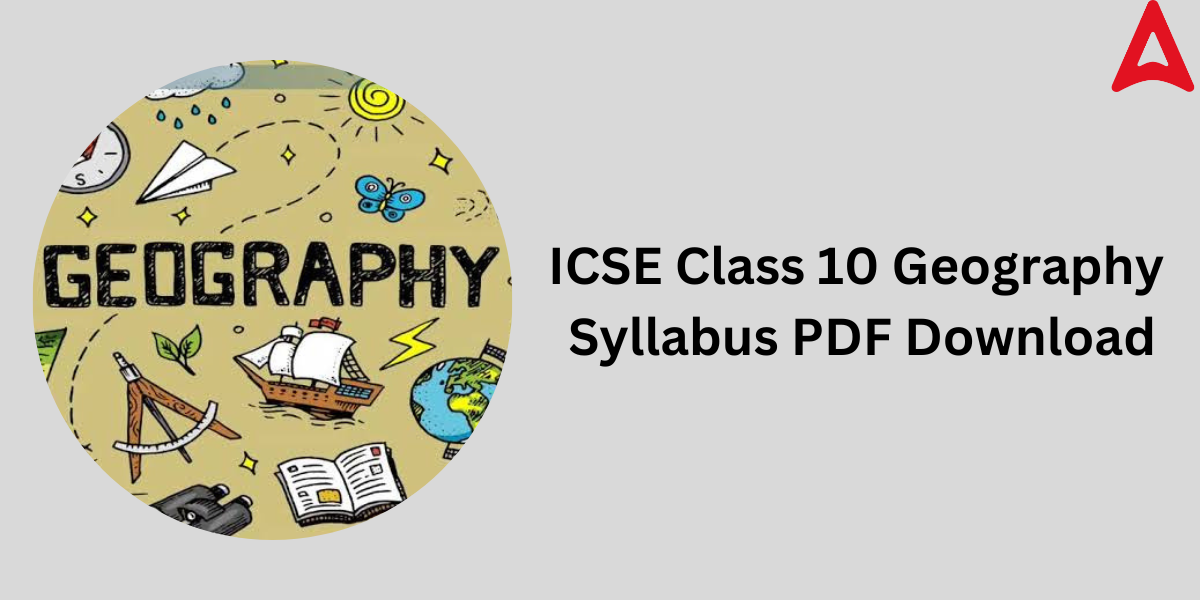ICSE Class 10 Geography Syllabus 2023-24: The ICSE Class 10 Geography Syllabus 2023-24 has been published on the official website of the Council for the Indian School Certificate Examinations (CISCE). Candidates who intend to take the ICSE Class 10 board exam in 2024 should familiarize themselves with the ICSE Geography Syllabus 2023-24 Class 10. In order to pass the exam with a good grade, students must acquire the ICSE Class 10 Geography Syllabus 2023-24 PDF from this page and boost up their preparation.
ICSE Class 10 Geography Syllabus 2023-24
The Council for the Indian School Certificate Examinations (CISCE) anticipates that the Class 10 exams 2024 will be held in February – March 2024, so the time has come to begin preparing for the ICSE 2024 board exams. Geography is an important subject taught in Class 10 as part of social studies. Students can use the most recent ICSE Class 10 Geography Syllabus 2023-24 to familiarize themselves with the course structure’s topics/chapters while studying and preparing for Class 10 Geography.
ICSE Syllabus Class 10 Geography Exam Pattern
It is essential to understand the geography exam pattern along with the ICSE Class 10 Geography Syllabus 2023-24. Check out the Class 10 Geography Exam Pattern listed below.
- There will be one paper of two hours duration carrying 80 marks and an Internal Assessment of 20 marks.
- The Paper will consist of two parts, Part I and Part II.
- Part I (compulsory) will consist of two questions. Question 1 will be based on Topographical Map. Question 2 will be based on an outline Map of India.
- Part II: Candidates will be expected to answer any five questions.
- Candidates will be expected to make the fullest use of sketches, diagrams, graphs, and charts in their answers.
- Questions set may require answers involving the interpretation of photographs of geographical interest.
ICSE Class 10 Geography Syllabus 2023-24 PDF
The ICSE Class 10 Geography Syllabus 2023-24 PDF is now available for download on the CISCE website. Candidates can get the ICSE Class 10 Geography Syllabus 2023-24 PDF from the official website and start studying right away. For the students’ accessibility, we have provided a direct link to download the ICSE Geography Syllabus Class 10 2023-24 PDF below.
ICSE Class 10 Geography Syllabus 2023-24 PDF Download
ICSE Geography Syllabus Class 10 2023-24
Candidates must extensively study and revise all of the topics in the ICSE Class 10 Geography syllabus 2023-24 in order to earn high scores in the Class 10 Geography test. The ICSE Class 10 Geography Syllabus 2023-24 is divided into two portions. Part 1 focuses on map work, while Part 2 focuses on Indian geography. The following topics are included in the ICSE Class 10 Geography Syllabus 2023-24:
ICSE Class 10 Geography Syllabus 2023-24 Part 1
Check out the topics and subtopics included in Section A of ICSE Class 10 Geography Syllabus 2023-24 below:
| PART – I: MAP WORK |
1. Interpretation of Topographical Maps
|
| 2. Map of India On an outline map of India, candidates will be required to locate, mark, and name the following: Mountains,
|
ICSE Class 10 Geography Syllabus 2023-24 Part 2
| PART – II: GEOGRAPHY OF INDIA |
3. Location, Extent and Physical features
|
| 4. Climate
Distribution of Temperature, Rainfall, winds in Summer and Winter, and factors affecting the |
5. Soil Resources
|
6. Natural Vegetation
|
7. Water Resources
|
8. Mineral and Energy Resources
|
9. Agriculture
– rice, wheat, millet and pulses. |
10. Manufacturing Industries
|
| 11. Transport Importance and Modes – Roadways, Railways, Airways and Waterways –- Advantages and disadvantages. |
12. Waste Management
|
ICSE Geography Syllabus Class 10 2024: Internal assessment
Candidates will be required to prepare a project report on any one topic. The topics for assignments may be selected from the list of suggested assignments given below. Candidates can also take up an assignment of their choice under any of the broad areas given below.
Suggested list of assignments:
- Local Geography:
(a) Land use pattern in different regions of India– a comparative analysis.
(b) The survey of a local market on the types of shops and services offered. - Environment: Wildlife conservation efforts in India.
- Current Geographical Issues: Development of tourism in India.
- Transport in India: Development of Road, Rail, Water and Air routes.
- List the different types of industries in the States and collect information about the types of raw materials used, modes of procurement, and disposal of wastes generated. Classify these industries as polluting or environment friendly and suggest possible ways of reducing pollution caused by these units.
- Need for industrialization in India, the latest trends, and its impact on the economy of India.
- Visit a water treatment plant, sewage treatment plant, or garbage dumping or vermicomposting sites in the locality and study their work.
| ICSE class 10 syllabus for other subjects | |
| ICSE Class 10 Maths syllabus | ICSE Class 10 English syllabus |
| ICSE Class 10 physics syllabus | ICSE Class 10 Chemistry syllabus |
| ICSE Class 10 History & civics syllabus | ICSE Class 10 Biology syllabus |









 CBSE Admit Card 2026 for Private & R...
CBSE Admit Card 2026 for Private & R...
 AILET 2026 AIR 1: Check Full Toppers Lis...
AILET 2026 AIR 1: Check Full Toppers Lis...
 AILET Result 2026 OUT, How to Download S...
AILET Result 2026 OUT, How to Download S...














